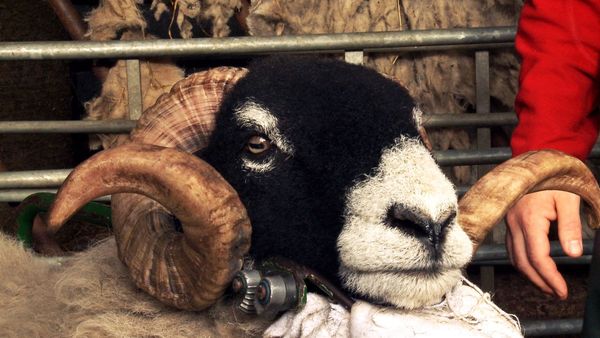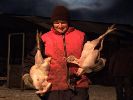Eye For Film >> Movies >> Addicted To Sheep (2015) Film Review
Addicted To Sheep
Reviewed by: Amber Wilkinson

"Swaledale sheep are one of the worst addictions known to man," says North Pennine tenant farmer Tom Hutchinson near the start of Magali Pettier's film. It's just as well they can't answer back, as he deftly introduces us to the tup in front of him, quickly highlighting why this apparently handsome creature isn't quite perfect for a number of reasons. His manner, and that of his wife Kay and their young children Jack, Esme and Hetty, is matter-of-fact, at times deliciously deadpan and demonstrates a strong connection to the landscape they live in as Pettier's camera follows them from winter through the seasons.
As the months tick by, Pettier quietly observes the comings and goings on the farm, from the sheep running through a fizzed up cloud of snow - recalling landscape paintings by Joseph Farquharson - to the family enjoying a toboganing session, unwrapping presents on Christmas morning or simply helping one another get jobs done around the place. The incidental music seems surplus to requirements, given the strength of the imagery. Signature shots - nicely edited together by Matt Dennis - are repeated with variations, such as washing flapping on the line, to help us judge the time of year and to emphasise the strong impact of the elements on farming life.

When it comes to descriptions, Pettier takes a surprising tack, letting the children explain the ins and outs of procedures such as the tupping (mating) of sheep. Young Jack does an excellent job of explaining the procedure in simple terms, while footage of kids in the local school also demonstrates their practical knowledge (extensive and impressive considering they are all under 10) and their deep love of farming. Their focus seems to be that living on a farm means "you can just run about and be a maniac" and they're hard-pressed to come up with a downside, which speaks volumes about the fact that their parents are in the sheep game as much for love as profit.
The kids have a forthright honesty and a keen awareness of the fact that death is part of life and Pettier's strong inclusion of them gives a real sense of the community that exists in these sorts of rural areas.
Its celebratory viewpoint recalls The Moo Man, this is a much less political film. Pettier slips into the measured rhythms of the farm and shows the amount of hard work and effort that the family put in rather than getting bogged down in the balance sheet. The result is an immersive charmer that shows how although this sort of life may seem remote to outsiders, those who live it have enviably strong connections.
Reviewed on: 28 Aug 2015
















